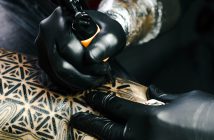If Tracy Chapman has her way, she will be awarded the profits derived from the song “Sorry” by Nicki Minaj among other things.
That’s because Ms. Chapman has filed Tracy Chapman v. Onika Tanya Maraj et al in California Central District Court, alleging that Ms. Minaj, whose legal name is Onika Tanya Maraj, employed the lyrics from Ms. Chapman’s 1988 single “Baby Can I Hold You” after Ms. Minaj’s licensing request was denied in June.
“Maraj’s manager e-mailed Chapman’s business managers, requesting that they connect Chapman with Maraj to discuss an idea of Maraj’s that is one of the most personal for her that was inspired by Chapman’s art that Maraj would like the opportunity to touch base with Chapman about,” wrote Ms. Chapman’s attorney Robert A. Jacobs in his Oct. 22 complaint.
At the core of the litigation is whether being inspired by Ms. Chapman’s art is an actual infringement on the part of Ms. Minaj. According to court records, Ms. Chapman, through her agents and representatives, even repeatedly denied Ms. Minaj’s after-the-fact requests to use the composition.
“It’s a dangerous line to cross once a judge starts allowing inspiration to constitute legal grounds for infringement,” said Tre Lovell, an entertainment attorney in Los Angeles.
The rapper did not respond to Pacer Monitor’s request for comment.
“Ms. Minaj could answer that she was simply borrowing the predictable ideas and messages from Tracy Chapman’s song,” said Taso Pardalis, an attorney in Manhattan. “If so, these would not be protected ideas under copyright law, however ideas and merged expressions linked with Tracy Chapman’s ideas and messages would be protected under copyright law and the First Amendment.”
Given the outcome of the Robin Thicke plagiarism lawsuit over the hit song Blurred Lines, Ms. Chapman could very well win her case and set a precedence for other entertainers to do the same. “You had musicologists in the Blurred Lines case breakdown the rhythm, the composition and the music so specifically in a scrutinizing way that it’s just a matter of expert persuasion in front of a jury,” said Mr. Lovell, who is currently suing Oprah Winfrey’s OWN network over a client’s script.
The subject matter experts were so convincing in the Blurred Lines litigation that the music infringement lawsuit ended with a jury verdict awarding millions to Marvin Gaye’s family members.
Defending against an infringement claim is further complicated these days by technology and the ability to sample online. Court records show a 10.2% increase in filings for copyright cases, according to Investopedia.
“You don’t have to drive to a music store and buy vinyl,” said Amy B. Goldsmith, co-chair of Tarter Krinsky & Drogin’s Intellectual Property group in Manhattan. “You can sit at home downloading tons and tons of compositions and music with your smartphone and you may not even know from where you were inspired.”
Part of the court’s determination will rest on whether it’s proven that Ms. Minaj inhibited the ability of Ms. Chapman to earn income from “Baby Can I Hold You.”
That’s also a hurdle that songstress Beyonce faces in Knowles-Carter et al v. Maurice et al filed in the New York Southern District Court against fashion clothing label Feyonce. “Defendants have benefited from the unlawful and infringing use of the Feyonce mark and lyrics from Beyoncé’s Single Ladies song because, upon information and belief, Defendants have derived and/or will derive substantial revenue from the sale of goods and/or the rendering of services offered and/or promoted on Defendants’ website and elsewhere through the use of a trademark that is substantially similar to Plaintiffs’ Beyonce mark and lyrics that are closely associated with Plaintiffs,” wrote Beyonce’s counsel Brad D. Rose, who also argued that allowing Feyonce to retain revenue and profits it has realized or will realize based on Beyonce’s fame and good will is against equity and good conscience.
However, magistrate James L. Cott denied a motion for an injunction that would have stopped Feyonce from selling the merchandise while the case is litigated, indicating that Beyonce is in for, not only a long and protracted legal battle, but potentially a very public one. Accordingly, on Nov. 15, Beyonce requested a settlement conference.
“Settlement proceedings could have been as much a business decision as a legal one to simply settle the matter rather than incur an expensive and risky legal battle while the defendants continue to use the Feyonce brand,” Mr. Lovell told Pacer Monitor News.
The downside of settling, however, is starting a trend that opens the floodgates for similar suits and buyouts. A telephone conference had been set by the Court for Nov. 29 at 2:30 p.m. however on Nov. 23 Feyonce’s Andre Maurice in San Antonio submitted a request for continuance.
Tips for Creatives to Avoid Litigation
–Document the material. “Paper yourself,” said Los Angeles entertainment attorney Tre Lovell. “State clearly in your letters of inquiry that you expect to be paid if any portion of the creative project is used.”
–Register the project with the U.S. Copyright Office. “That starts your protection,” Mr. Lovell said.
–If the creative property is used without your knowledge and consent, send a dated cease-and-desist notice, preferably from a copyright infringement attorney, and include a request for an accounting of all the money earned. “Once you or your attorney do that, the television network, fashion label or record label is aware of the infringement,” said Mr. Lovell. “If they continue to use your creative project, you’ve then established intent, which can increase your damages and/or make your case easier to prove since the defendants are aware of the infringement and continued to exploit your creative property.”






